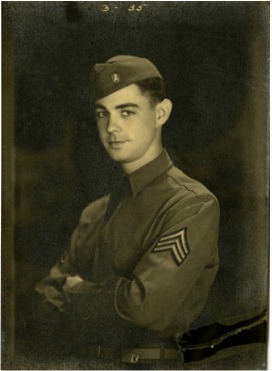Foote's Military Career
Born in 1916 during the first World War, Shelby Foote grew up in Greenville, Mississippi, where he learned about his family’s involvement in the Civil War. In fact, his great-grandfather, Hezekiah William Foote, was a Confederate soldier who fought in the Battle of Shiloh. As Foote grew up, his interests were drawn toward the military and war. Following his departure from the University of North Carolina, Foote enlisted in the military, just in time to be shipped to England, in the midst of World War II. Although he did not see action, Foote reflected decades later, “‘I felt very strongly that we should be in the war – to stop Hitler –so I joined the Mississippi National Guard.’”[1]
However, Foote did not have the discipline to be a private. In an interview with journalist Tony Horwitz, Foote later stated, “I never had much use for turning the other cheek. I always buck back, particularly when any authority leans on me.”[2] Foote continually had issues with his superiors, and until the last instance, he escaped clean. However, this lack of respect for authority led to Foote’s dismissal from this military, just before D-Day. Foote was Other than Honorably discharged in May 1944 for taking a military Jeep too far from camp in order to visit Tess Lavery, his future first wife. Foote was devastated. His discharge caused him, as Horwitz wrote, to miss “the great trauma of his own generation’s adolescence.”[3] Because he missed out on his own great trauma, Foote turned to the nation’s first great trauma, the Civil War.
Foote’s studies of the Civil War led him to develop a particular admiration for Confederate General Nathan Bedford Forrest. Forrest was a self-made man who was not educated, but nevertheless had a great military mind. He fought in the Battle of Shiloh, and Foote admired Forrest’s battle tactics and bravery. Foote chose, in a sense, to live vicariously through Forrest, the only soldier in both the Union and Confederate armies to rise from private to lieutenant general by the end of the war. According to Horwitz, Foote believed that “Forrest also epitomized certain ‘antique values,’ such as cunning and initiative, which had been lost in our own century’s warfare.”[4] To Foote, Forrest was a role model, and because he never experienced war for himself, Foote could participate in the Civil War by writing about Forrest.
Footnotes
[1] Shelby Foote, interview by James Newcomb, “WKNO Presents a Conversation with Shelby Foote,” Conversations with Shelby Foote, Ed. William C. Carter (Jackson: University Press of Mississippi, 1989), 114.
[2] Horwitz, Tony. “At the Foote of the Master.” Confederates in the Attic: Dispatches from the Unfinished Civil War (New York: Vintage Books, 1998), 148.
[3] Ibid., 149.
[4] Ibid., 155.
